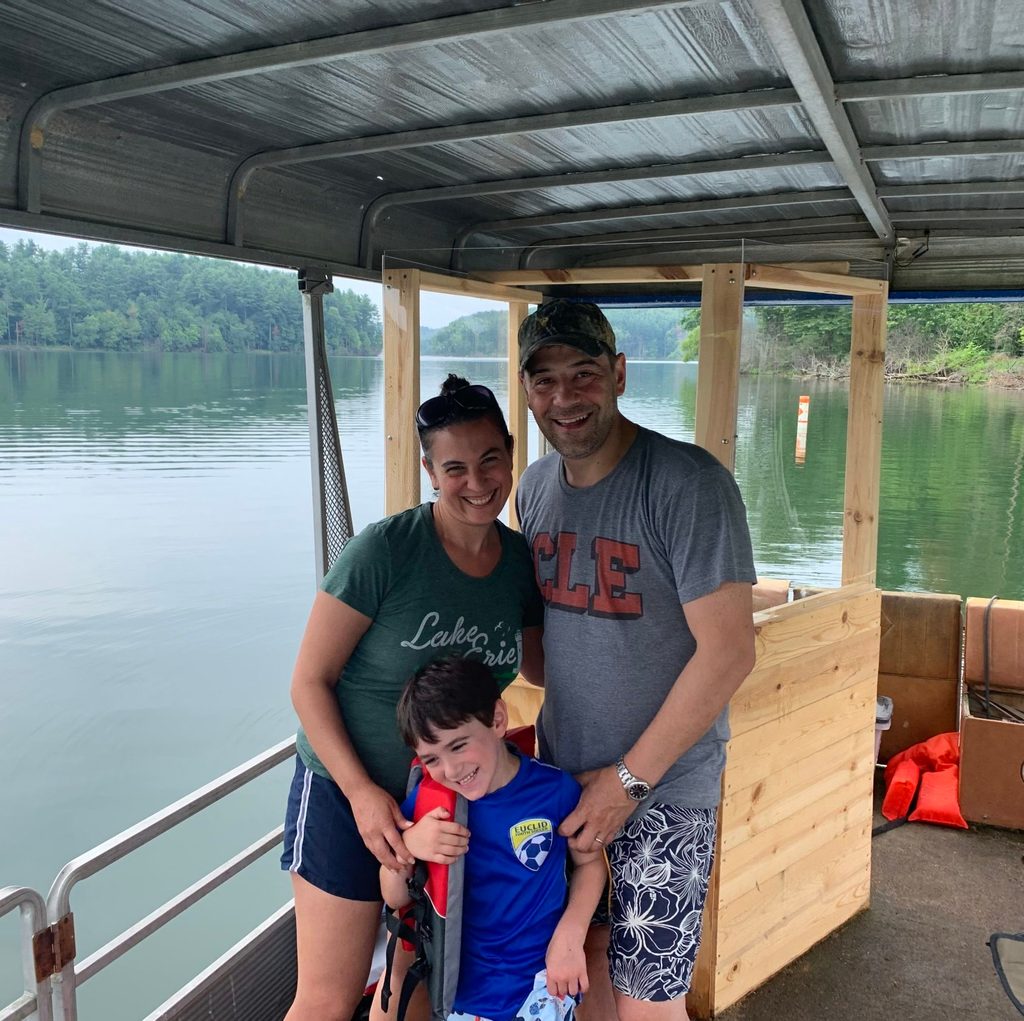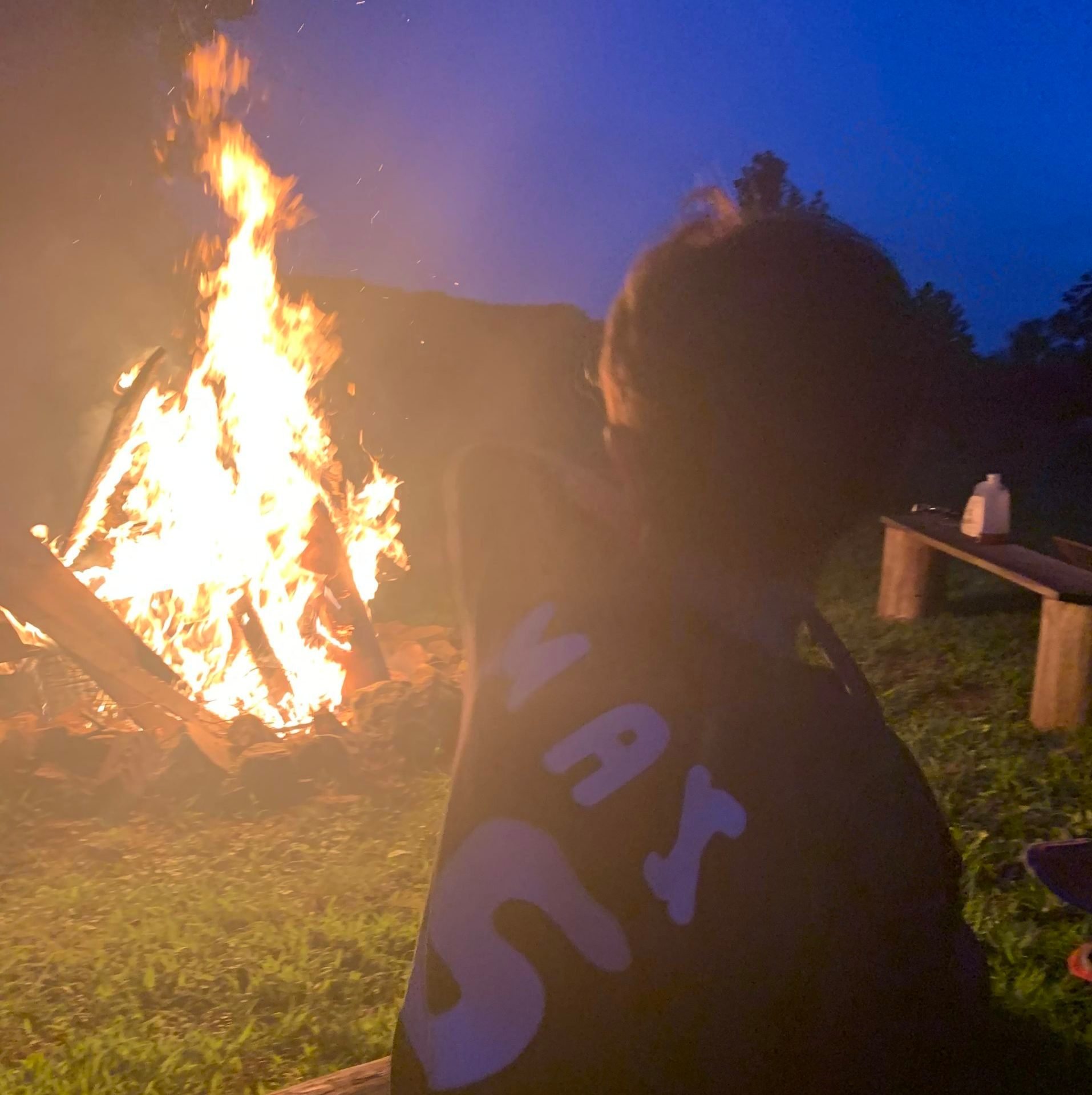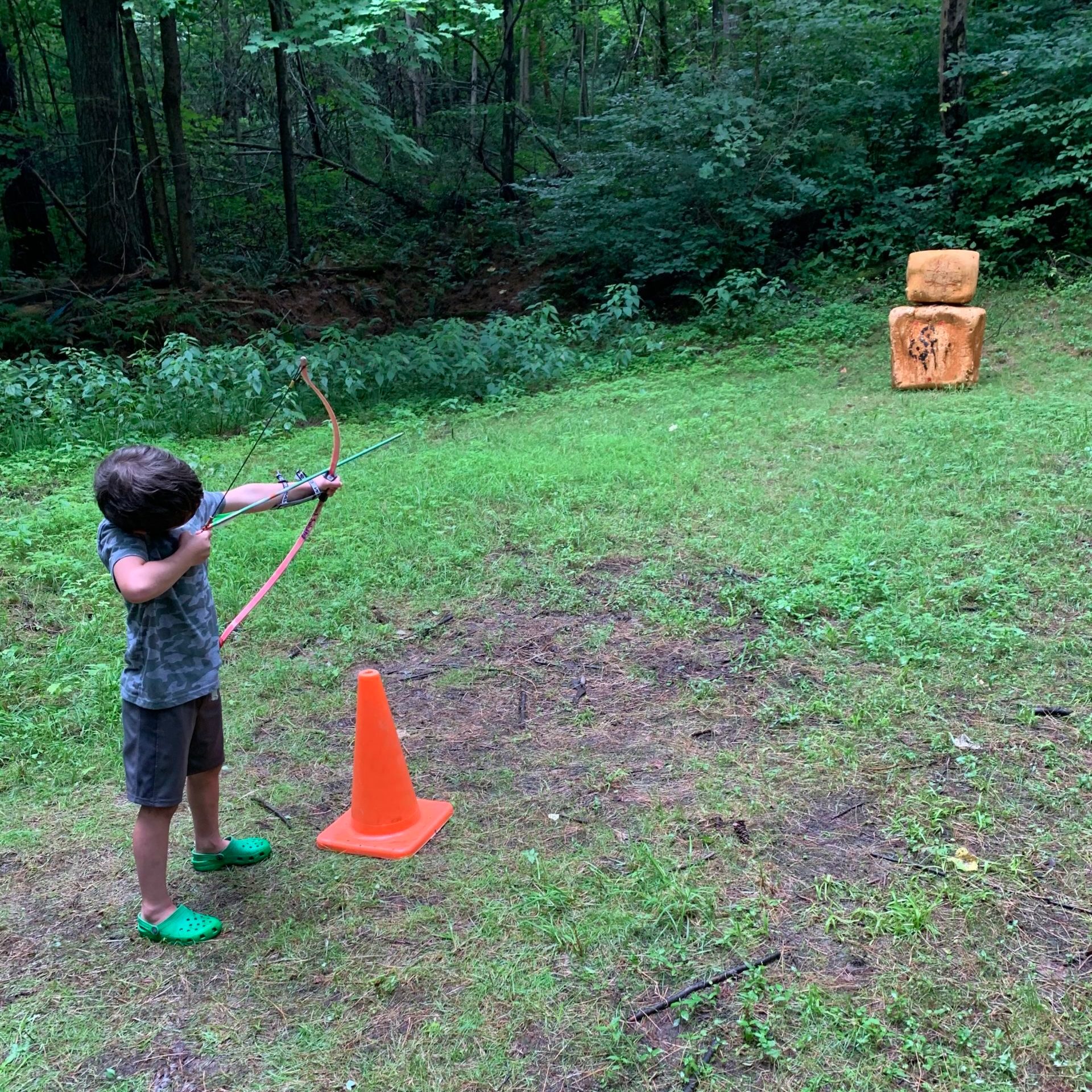Why I Signed Up for Family Camp During the Pandemic
Updated: Feb. 27, 2023

How one writer and her family experienced a life-changing escape from coronavirus reality at summer camp.
As a working mother of a five-year-old, I tried to handle my state’s stay-at-home orders and subsequent school closure with as much grace as I could. As experts suggested, I looked to make the best of the situation. I scheduled work calls around kindergarten Zoom meetings, accepted that Dora the Explorer was, if not a perfect babysitter, then at least a semi-acceptable one, and proclaimed that drawing on the iPad was “almost like art class!” I only cried in my pillow a few nights per month.
But the day they canceled my son’s day camp, all grace went out the window. For months, as my family sat confined in our home in Cleveland, fighting over charging cords and binging on coronavirus updates, I had envisioned camp as the promised land. Like so many others, camp had always been the highlight of summer for me. And I had been excited for our risk-averse only child to experience things like group swim lessons, ropes courses, and color war for the first time. Yes, it was true Max might have spent too much time playing Roblox Shark Attack by himself, but in June he’d be swimming in an actual lake, sharing jokes and neon-colored lanyards with friends, and learning resiliency, which was not currently his strength. My husband, Geoff, and I would be relieved, for a few hours a day, of the exhaustion of trying to simultaneously be full-time working professionals, parents, teachers, and social directors. At camp, there would be actual counselors! With experience! And planned activities!
The week after that cancellation announcement was not our best one.
Then my friend Jackie told me about family camp.
Transformations
To help recoup some of the costs of camps being canceled due to safety concerns of the virus, some sleep away camps around the country, like Camp Roosevelt-Firebird in Ohio, had decided to open up their campuses to families. Moving as a unit, family camp offered the opportunity for families to do all the things a camper normally does: swimming, boating, arts and crafts, archery, sleeping in cabins—but together and in a socially distant way.
Suddenly the promised land seemed reachable again. At family camp, I hoped that Max might find some level of normalcy. That he would interact with other kids, go hiking in the woods, and walk away with good memories that would counteract the experience of living through an isolating pandemic. And that my husband, who had never attended camp as a child, might be able to experience some of the magic of camp that I was constantly talking about.
At the very least, it would give us all a much-needed break from our electronics. Four days without internet on a 103-acre pastoral field in Bowerston, Ohio, next to a lake, sounded way better than say, a vacation at a Holiday Inn in Maine that required a 14-day quarantine before we could set out and explore.
The beginning
The morning we left the gray clouds echoed our mood. Packing for family camp, it turned out, was just as laborious as packing for sleepaway camp. Loading the car took hours and my husband was distracted dealing with a work situation. We’d just found out that the camp owner’s father had died days before, and I worried that his sadness would damper the experience. Also, the weather looked bad. At the last minute, I decided to pack the iPad.
But 90 minutes later, we found ourselves outside the city, driving through tree-lined streets and past farmhouses with rocking chairs on the porches. Soon, we saw the brown wooden sign with the words “Roosevelt-Firebird.” We drove down a hilly, white gravel-lined road and collectively gasped as a large, glittery lake appeared before us.
At the entrance to the camp, four counselors and Joe Mendes, the camp owner/director, greeted us, smiling behind their masks as we got out of the car. “We’re so glad you’re here,” Mendes said.
And suddenly so were we.
Arrival
Counselors took our temperatures, asked if we’d experienced any fevers or body aches then announced “we’d passed.”
“Our goal of family camp,” Mendes said, “is to offer up services to families that have been cooped up.” Mendes added that it wasn’t his intention to make us do any activities we didn’t want to.
“But I do recommend,” he said with a twinkle in his eye, “taking out the pontoon boat and jumping off the side.”
Max looked up from where he’d been drawing in the dirt with a stick. “Never,” he said.
But then my soon-to-be first grader got distracted by an overly social rooster named Shale, who began following him around.
“Roosters typically interact in groups,” Mendes explained.
Shale—like Max—wasn’t used to being alone.
Over the weekend, they became their own flock.
Unpacking bags and stories
As we unloaded our bags, Mendes came to check on us. “How did you come to buy the camp?” my husband asked.
Already knowing the story, I prepared the tissues. Here we go, I thought.
Camp, Mendes explained, had been a transformative experience for him. He’d arrived as a shy camper at North Star Camp in Wisconsin, and left with close friendships and a new confidence.
Mendes wanted to be able to give those same life-changing experiences to other kids. He’d spent most of his thirties chasing a dream of owning a summer camp. He’d come close a few times, but the opportunities all fell through. With a wife and kids to support, he’d given up.
“My wife said to me, why don’t you try teaching elementary school? It’s kind of like camp,” Mendes said.
So he did. Then five years ago, the owner of Roosevelt-Firebird died unexpectedly. With the help of Mendes’ father, Harold, Mendes was finally able to fulfill his dream at age 53.
And then—as I’d feared—tears welled up in Mendes’ eyes. “Why is he crying?” Max asked.
Feelings
I thought about what to say. It wasn’t a sad cry exactly. But it was an expression of a loss, something we all knew a little something about. “We’re all missing people and things these days,” I finally said. Max nodded, then sat down silently across from Mendes, in act of solidarity and companionship.
“This,” I told my husband later, “is camp.”
(Well, that –and the super uncomfortable beds. Which we fell into, after taking a late-night pontoon ride [“Want to take the wheel?” my husband asked Max. “Never,” he replied.])
Day 1
The next morning a sign-up board awaited us with potential activities. We chose archery, boating, and tubing.
To get to the archery range, we hiked through a narrow path in the woods.
Max went first. He picked up a bow and plucked an arrow with light green feathers out of an orange cone. Then he got into an archer’s stance. “Pretend you have a soda can between your shoulders and crush it,” Ed, the counselor, directed.
Max nodded and let the arrow release. It fell flat. I held my breath, anticipating what he would do. This was a child, after all, who walked off the soccer field when another player scored on him.
But Max simply picked up the next arrow and concentrated on pushing together his shoulder blades. The next arrow went a little farther. And three tries later, there was a loud thwump as it hit the target. “I’m doing a pretty good job,” Max said triumphantly.
Later, I insisted Geoff take a turn. My husband grabbed a bow and casually pointed it at the target, where it landed inches from the bullseye. I looked at him in disbelief. “Oh did I never mention that I used to go to an archery range as a teen?” my husband of almost nine years said with a mischievous grin.
Around the campfire
 After a swim in the lake and another turn on the pontoon boat, it was time for an all-camp campfire with the other two families. We arranged our camp chairs around the fire at a socially appropriate distance and smiled politely at each other, the adults holding plastic cups of wine like security blankets.
After a swim in the lake and another turn on the pontoon boat, it was time for an all-camp campfire with the other two families. We arranged our camp chairs around the fire at a socially appropriate distance and smiled politely at each other, the adults holding plastic cups of wine like security blankets.
As the over-enthusiastic ringmaster, Mendes aimed to bring us all together. He started with a tournament-style, competitive rock, paper, scissors game. Then the counselors took us through a slightly edited, very off-key version of The Beatles’ “Yellow Submarine.”
Around 8:30 things seemed to peter out. We began gathering our things when Mendes came back to the circle carrying a massive white broken bench which he heaved into the fire. Suddenly the flames—and the night—was roaring again.
“If all else fails, burn things,” Mendes said, as Max and the kids scattered to find new branches and brush to keep the fire going. Meanwhile, bars of chocolate were unwrapped and marshmallows stabbed with sticks. But louder, even then the crackling of the fire and the crinkling of the wrappers, was the sound of the kids’ laughter as they twirled the marshmallows around the flames.
Rain
The next morning came the rain. Max lobbied for the iPad. “You know what’s really great in the rain?” Mendes asked us. “Swimming in the lake.”
My family looked unconvinced. But later that morning as the rain slowed, we decided to take out the pontoon boat. Throwing sweatshirts over our swimsuits, we headed out on the water. A few miles out, Geoff dropped anchor. “It’s time to jump,” he declared.
My husband cannonballed off the side, landing in the water with a thud. “Joe was right,” he laughed. “This is the best.” He held out his arms for Max to jump.
Wearing his life jacket as tight as a tourniquet, Max closed his eyes—and leaped. Fear turned to delight as he realized what he’d done. “This is even better than winning at Roblox,” he said. Bobbing in the water, he told me it was my turn to try. And so, conjuring up my 15-year-old self, I dived into the warm water, feeling it cleanse and revive, then swum up to join my family.
Endings
At the end of camp every year, Mendes leads campers in a closing ceremony. As part of the ritual, everyone is asked to throw a stick in a fire and thank someone else for an experience they had over the summer. “I’ll start,” Mendes said.
“I think you know that I lost my father,” he said. We all nodded solemnly. “So I want to thank all of you,” he said—looking pointedly at Max and the other kids—”for making me really happy during a really hard time.”
Then my husband took a stick. “I want to thank Max for being so brave and being so great on the boat,” he said, and added it to the pile.
And then it was my turn. “I want to thank Joe for giving us this experience, for letting my family experience a little bit of magic during this time. And for not once turning on any electronics.”
Awards
 Before the ceremony ended, Mendes announced that he had a surprise. After having watched the kids all weekend, he and the other counselors had decided to give out a special award, something that had been given out only one time all of last summer. It was called the Silver Bow award and it was awarded to campers who had demonstrated grit and improvement. Ostensibly, it was an archery award, but the badge also symbolized overall resiliency.
Before the ceremony ended, Mendes announced that he had a surprise. After having watched the kids all weekend, he and the other counselors had decided to give out a special award, something that had been given out only one time all of last summer. It was called the Silver Bow award and it was awarded to campers who had demonstrated grit and improvement. Ostensibly, it was an archery award, but the badge also symbolized overall resiliency.
As an adult, I have come to realize that awards are often meaningless, but as a parent I also really, really wanted Max to win. “Whatever happens, I’m proud of you,” I whispered to Max.
And then Mendes called Max’s name. The smile on his face as he walked up to accept the badge was bright enough to light up the whole camp.
New traditions
When the award ceremony ended, I looked around the camp, trying to soak everything in—the red rickety cabin, the sulfur water that smelled like sour eggs, the lake that gleamed like polished glass, and wondered how we could keep this—and also how we could possibly leave.
And then the skies opened up again, making that whole leaving thing much easier. As we scrambled to our cars, Mendes said, “At camp, we don’t say good-bye, we say see you later.”
“See you later,” Max yelled. And my son’s words felt true. That these experiences and moments would not be lost; that they’d linger in the same headspace that other important memories lived. That we would never forget watching, in real-time, as Max’s confidence grew. Or the connectedness we felt, turning to each other, and not our electronics, for comfort.
But also, literally, Mendes’ departing line out to be true. Family camp, we learned, soon after arriving home, had been extended till the end of October. We have already signed up for our next weekend. Next, read on for some of the funniest letters ever sent from camp.
